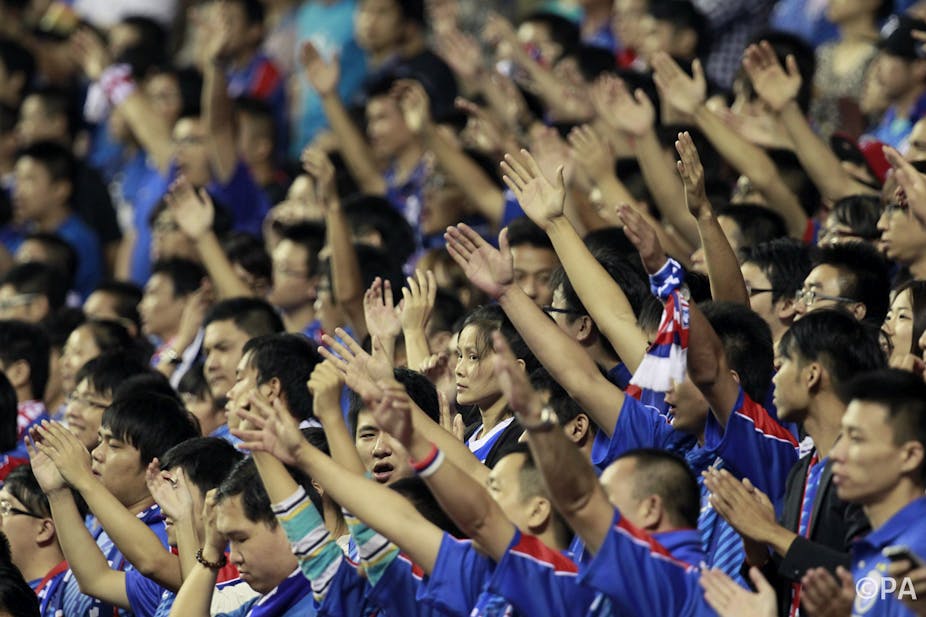In the run up to the London Olympics, Jacques Rogge, then president of the International Olympic Committee, made a surprising statement. Doping, he said, was no longer the number one threat to the integrity of sport. Match-fixing and illegal betting had taken its place.
The seven arrests by UK authorities for football match fixing in the past week, including at least three footballers, an agent and a so-called international football “fixer”, appear to justify Rogge’s concerns.
The investigation centres on semi-professional and amateur football players some way below the elite Premier League. According to reports in the Telegraph, it appears that footballers were approached by international fixers to rig games for money and, benefiting from this inside information, bets would then be placed on Asian-based gambling websites.
In recent years an array of international agencies from the UN Office on Drugs and Crime to Interpol, the European Commission and Transparency International, have all warned sport of the illegal gambling threat emanating from criminal syndicates based, principally, in Singapore. There is a further worry about accompanying criminality where sport is used as a conduit for international money laundering and tax evasion.
The common theme is that growth in the global sports betting market has made sport more vulnerable to illegal scams. Including both the illegal and legal betting markets worldwide, the industry is worth up to US$1 trillion. Football accounts for 70% of the market, largely down to the popularity of both gambling and the English Premier League in Asia.
Top football leagues in Italy, China, South Korea, Finland and Turkey have recently been tainted by allegations of fixing. In February of this year, an investigation involving Europol and police teams from 13 European countries uncovered an extensive criminal network dedicated to football match-fixing, involving a total of 425 matches and including Champions League fixtures.
Now, it appears to be English football’s turn.
The “told you so” attitude from some international commentators has been a little disappointing. Fifa’s former head of security Chris Eaton insists “it was only a matter of time” before a match-fixing investigation uncovered corruption in English football. The argument is that, in spite of mounting international concern, the Football Association (FA) has remained “complacent” on match-fixing.
However, despite this latest scandal, it needs to be highlighted that the UK anti-match-fixing model is one of the best in the world.
The UK has a long history of regulating sports gambling, stretching back to Henry VIII’s decision to ban various games that were proving a distraction from archery.
Take horse racing, a sport that exists only as an accessory to the gambling industry. It has its deepest historical roots in the UK and unsurprisingly, therefore, the British Horseracing Authority is a world leader in illegal betting prevention. Two years ago it successfully uncovered the largest race-rigging conspiracy in the sport’s history, resulting in four jockeys, two owners and their associates being banned from the sport for a total of 66 years.
Football itself has a history of match-fixing scandals: from the infamous fix between Liverpool and Manchester United in 1915; to the jailing of ten players for rigging football league matches in the mid-1960s; and into the late 1990s when Malaysian gamblers attempted to manipulate football betting markets by sabotaging the floodlights at games.
In short, the FA can draw on this institutional memory and expertise within British sport in order to address any the threat from match-fixing today. Snooker provides a good example, drawing on this same background when issuing a 12-year ban to Stephen Lee for match rigging.
UK sports bodies, including the FA, have long acknowledged that they cannot address the threat from match-fixing by themselves. They have reached out when necessary to the regulated betting industry, the national gambling regulator and law enforcement agencies to pursue a joined-up approach on match-fixing.
Before the London Olympics, for instance, UK sports authorities worked with the Gambling Commission, the London Metropolitan Police, the IOC and others to set up a special unit to monitor corrupt sports betting activity during the games. The IOC is currently adopting this model as best practice for future Olympics and major sports events worldwide.
British sport has also realised that the best way to stop the demand for illegal betting on sports events is to cut the supply of players and athletes willing to cooperate. Players are now educated on the dangers of being approached and groomed by third parties looking for match-fixers. Take cricketer Mervyn Westfield, for example. After being jailed last year for deliberately bowling badly to help out illegal gamblers, he is now out of prison and working to help the fight against corruption in a game he is still officially banned from.
Gambling-related cheating has existed since sport itself began. Its causes will never be eradicated but its effects can be minimised. Despite the current football investigation, the British model on match-fixing prevention is robust.

